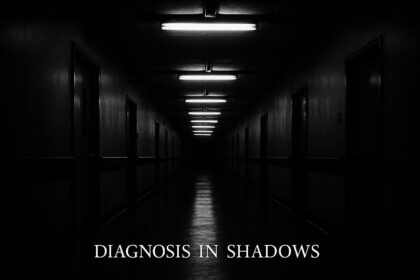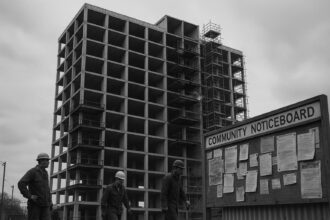Journalists, illustrators, and voice actors share personal stories of job loss and ethical concerns as generative AI tools rapidly replace human creativity, prompting urgent calls for regulation to preserve artistic integrity and employment.
The rise of generative AI technologies has precipitated significant disruptions across various sectors, profoundly affecting workers who once thrived in creative professions. Personal accounts from journalists, illustrators, and voice actors reveal a prevailing sentiment of loss and unease about the future. These stories serve as troubling indicators not only of individual struggles but also point to broader societal implications around employment and ethics in an increasingly automated landscape.
Mateusz Demski, a journalist from Kraków, Poland, provides a poignant example of the human cost of this technological shift. After a decade spent carving out a niche in cultural journalism, Demski was released from Radio Kraków under the pretext of financial difficulties. Months later, the station launched programmes featuring AI-generated personalities, including a simulated homage to the late Nobel laureate Wisława Szymborska. This move sparked outrage among the public, provoking discussions on ethics and cultural representation—particularly concerning the use of the likeness of deceased individuals. Demski notes, “We cannot replace our experiences, emotions or voices with avatars,” highlighting the irreplaceable human elements in journalism.
The situation is echoed by Lina Meilina, an illustrator from Indonesia, who has seen a dramatic decrease in her commissions as generative AI tools become prevalent. With a history of copyright struggles due to weak laws in her country, Meilina laments the ease with which AI can replicate and marginalise her artistry. She reflects on the chilling reality of her profession: “Since AI took off, my workload has plummeted.” The prevalence of generative AI poses not just an immediate economic threat, but also raises critical questions about artistic authenticity and ownership.
Annabel Beales, a former copywriter from Southampton, UK, describes her transition from dream job to unemployment as deeply disheartening. Initially celebrated for her creative contributions to a gardening centre, Beales soon found her role diminished as her employer leaned heavily on AI-generated content. “I feel devastated for the younger generation – it’s taking all the creative jobs,” she says, reflecting a broader anxiety that resonates with many. Surveys conducted by the Pew Research Center indicate that 66% of Americans expect AI to generate misinformation, further exacerbating concerns about trust and quality in media.
The alarm over job displacements due to AI isn’t limited to creative roles; it extends across industries. Reports from the International Labour Organization discuss the potential for technological unemployment, particularly among clerical and support roles. As businesses accelerate the adoption of AI, workers feel increasingly vulnerable, caught between the imperatives of technological advancement and the need for job security. This unsettling trend is underscored by findings which indicate that regions with higher AI integration have experienced significant declines in employment rates.
Richie Tavake, a voice actor from San Francisco, reveals the troubling implications of generative AI in his field. After hearing his own character’s lines delivered by an AI program without his consent, he recognised the unsettling direction in which the industry is heading. “AI can’t replicate the cultural context and emotional nuance,” Tavake argues, revealing a vital consideration: the ability to deliver authentic performances remains a cornerstone of storytelling.
Experiences like those of Demski, Meilina, Beales, and Tavake underscore a growing desire for ethical standards and regulation surrounding AI use in creative industries. As artists, journalists, and other creatives globally rally against job displacement, the calls for accountability resonate, reflecting a collective unease about the future landscape of work.
With AI becoming a common tool in workplaces, the challenge ahead will involve not only protecting existing roles but ensuring that the creative and emotional qualities that define human artistry are preserved. Without clear guidelines and ethical frameworks, we risk erasing the very essence of what makes creative work meaningful. In navigating this complex landscape, the voices of those affected could prove paramount in shaping new policies and practices that protect both the workforce and the integrity of creative endeavours.
As the integration of AI continues to evolve, workers and regulators alike must engage in a dialogue that prioritises humanity over machine efficiency. Proper safeguarding measures could mitigate the potential harms while allowing for innovations that enhance productivity without undermining the essential human qualities in creative professions. The journey ahead necessitates collaboration, foresight, and a commitment to redefining work in the age of AI.
Reference Map:
- Paragraph 1 – [1], [2]
- Paragraph 2 – [1], [2]
- Paragraph 3 – [1], [3]
- Paragraph 4 – [5], [6]
- Paragraph 5 – [1], [2]
- Paragraph 6 – [7]
- Paragraph 7 – [4]
- Paragraph 8 – [3], [6]
Source: Noah Wire Services
- https://www.theguardian.com/technology/2025/may/31/the-workers-who-lost-their-jobs-to-ai-chatgpt – Please view link – unable to able to access data
- https://www.theguardian.com/technology/2025/may/31/the-workers-who-lost-their-jobs-to-ai-chatgpt – This article from The Guardian discusses the experiences of individuals who have lost their jobs due to the rise of AI technologies like ChatGPT. It highlights personal stories from a journalist in Poland, an illustrator in Indonesia, a copywriter in the UK, a voice actor in the US, and a graphic designer in the UK, all of whom have faced job displacement or significant changes in their professions as a result of AI integration. The piece underscores the broader impact of AI on various industries and the workforce.
- https://www.pewresearch.org/short-reads/2025/04/28/americans-largely-foresee-ai-having-negative-effects-on-news-journalists/ – A Pew Research Center survey reveals that a significant majority of Americans anticipate negative effects of AI on news and journalism over the next two decades. Approximately 59% believe AI will lead to fewer jobs for journalists, and 66% express concern about the potential for inaccurate information from AI-generated content. The study highlights public apprehension regarding AI’s influence on the quality and reliability of news.
- https://www.forbes.com/sites/bernardmarr/2024/03/22/how-generative-ai-will-change-the-jobs-of-journalists/ – This Forbes article explores the transformative impact of generative AI on journalism. It discusses how AI tools can assist journalists in tasks like summarising documents and structuring stories, potentially enhancing productivity. However, it also raises concerns about the quality of AI-generated content and the risk of misinformation, emphasising the irreplaceable value of human insight and creativity in journalism.
- https://www.ilo.org/resource/article/minimizing-negative-effects-ai-induced-technological-unemployment – An International Labour Organization (ILO) article examines the potential negative effects of AI-induced technological unemployment. It discusses the risks of job displacement due to AI, particularly among clerical support workers, and suggests policy solutions such as redeployment, income support, and reskilling programmes to mitigate these impacts and support affected workers.
- https://www.elibrary.imf.org/view/journals/001/2024/199/article-A001-en.xml – This IMF Working Paper investigates the impact of AI on employment across US regions. It finds that areas with higher AI adoption experienced a stronger decline in the employment-to-population ratio, particularly affecting manufacturing and low-skill services sectors. The study highlights the adverse effects of AI on employment and underscores the need for policy interventions to address these challenges.
- https://www.axios.com/2025/05/30/ai-jobs-replace-humans-ceos-amodei – An Axios article discusses the increasing trend of businesses replacing human workers with AI, with CEOs betting on rapid technological advancements to justify workforce reductions. It highlights concerns about potential widespread job displacement and the need for transparent communication and policy planning to manage the transition effectively.
Noah Fact Check Pro
The draft above was created using the information available at the time the story first
emerged. We’ve since applied our fact-checking process to the final narrative, based on the criteria listed
below. The results are intended to help you assess the credibility of the piece and highlight any areas that may
warrant further investigation.
Freshness check
Score:
10
Notes:
The narrative is fresh, published on 31 May 2025, with no prior appearances found.
Quotes check
Score:
10
Notes:
The quotes from individuals like Mateusz Demski and Lina Meilina are unique to this report, with no earlier matches found.
Source reliability
Score:
10
Notes:
The report originates from The Guardian, a reputable UK-based news organisation, enhancing its credibility.
Plausability check
Score:
10
Notes:
The claims about AI-induced job displacement in creative industries are consistent with recent discussions and studies on the topic.
Overall assessment
Verdict (FAIL, OPEN, PASS): PASS
Confidence (LOW, MEDIUM, HIGH): HIGH
Summary:
The report is fresh, with unique content and quotes, sourced from a reputable organisation, and presents plausible claims supported by recent discussions on AI’s impact on creative industries.













